Iraqis Advance Toward Self-Security
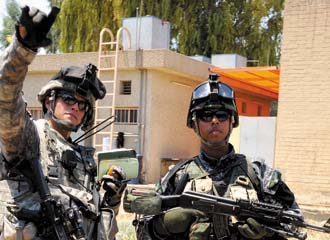 |
Staff Sgt. Thomas Cheek, USA (l), a section sergeant from A Troop, 5th Squadron, 7th Cavalry Regiment, 1st Advise and Assist Brigade (AAB), 3rd Infantry Division, talks to a corporal from the 3rd Battalion, 7th Brigade, 2nd Iraqi Federal Police Division, during a patrol. The corporal is part of a group of policemen who lived and worked with A Troop in order to receive more in-depth training while improving the Iraqi/American partnership. |
The 1st Advise and Assist Brigade, 3rd Infantry Division (1/3 AAB) of the U.S. Army, worked in-country from December 2009 to December 2010 to help the Iraqi army and Iraqi Federal Police improve their skills and move further down the road to full operations. Soldiers in the
Though much of the advice is directed at tactical operations, occasionally the Iraqis asked for more information regarding communications technology. To help handle those questions, Maj. James Trimble,
Most of the time he worked on those assets only for the
One task that fell outside his purview was establishing interoperability between
Gaps in interoperability do not seem to be causing problems, in part because constant tie-in to the Americans might not be as important as it once was. “The success story here is really how well the Iraqis are doing,” Maj. Trimble says. “I think that’s the biggest thing we could put out to the public.” Though he admits he is somewhat unfamiliar with perceptions in the
Though the Iraqis are moving toward autonomy, Maj. Trimble still faced several challenges during his time in-country. One of the biggest obstacles was the physical space in which his brigade operated. He explains that with satellite-based communications, troops were able to stay in contact over a larger area than with older point-to-point solutions, but keeping everyone connected still proved difficult. When the troop drawdown in
Another challenge Maj. Trimble faced was managing the expectations of his colleagues who sometimes failed to understand the communications limitations inherent in an austere environment. Part of the management included avoiding making promises. “‘Always’ and ‘never’ are two of the most dangerous words in the English language,” he says.
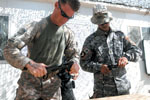 |
Staff Sgt. Tim Griffin, USA (l), a section leader and senior scout from A Troop, 5th Squadron, 7th Cavalry Regiment, 1st AAB, 3rd Infantry Division, races a sergeant from the 3rd Battalion, 7th Brigade, 2nd Iraqi Federal Police Division, to see who can disassemble and reassemble an M9 pistol the quickest during a day of training. |
He also cared about making sure troops had some method to reach out to people they must contact, whether the communication passed through the tactical Internet, telephone, radio, instant message or something else. During its time in
Fortunately, technology gaps were practically nonexistent. “We are an amazingly well-outfitted force as far as communications are concerned,” Maj. Trimble says. “We have phones that work all the time. We have very good radios.” Troops stationed at established bases in
When a command post has been in place for several years, such as those around
One of the best technologies for troops in
As Maj. Trimble made preparations to turn over his role to the brigade that came in to replace his own, he had a suggestion for how the command, control, communications, computers, intelligence, surveillance and reconnaissance (C4ISR) community could support troops. He urges those in the C4ISR realm to understand the similarities between jobs in the private sector and those in the military. Despite slightly different attire and the addition of carrying weapons, “The armed forces communications community is doing the same thing as the industry community,” the major says.
For the most part, companies seem to be paying attention. “I have extreme challenges keeping my soldiers in the Army because they’re in such high demand,” the major says. “That’s a compliment and curse at the same time.” He emphasizes that his troops are well-trained and have on-the-job experience. “I want to thank civilian organizations for hiring ... my soldiers,” he adds.
Some hiring authorities in industry may be wary about employing veterans because they are unsure what duties and functions troops performed while in service. Maj. Trimble emphasizes that these people carry out the same jobs as those in the civilian world, but with added stresses, such as combat. He says if employers see military signal experience on a resume, they should be aware that the applicants not only have relevant understanding of the communications realm but also have invaluable job experiences only available in combat zones.
WEB RESOURCES
1/3 AAB on DODLive: www.dodlive.mil/index.php/tag/1-3-aab
3rd Infantry Division on Facebook: www.facebook.com/1hbct.3id
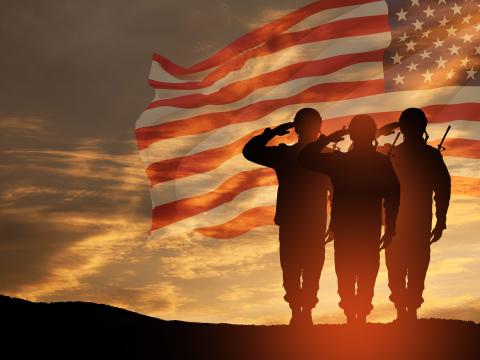

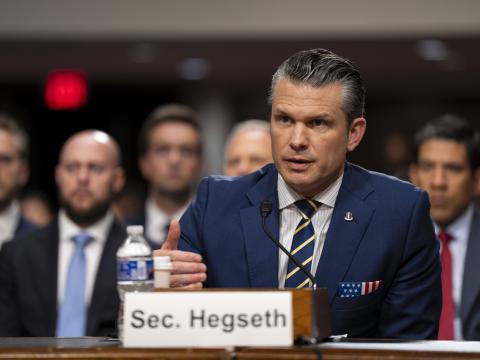
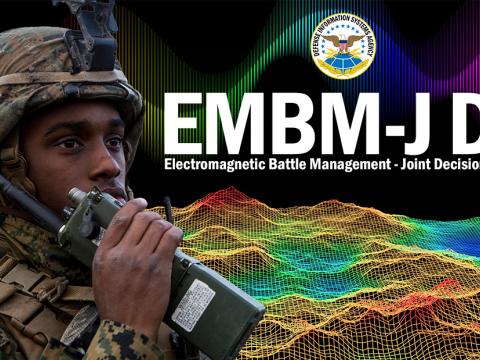
Comments